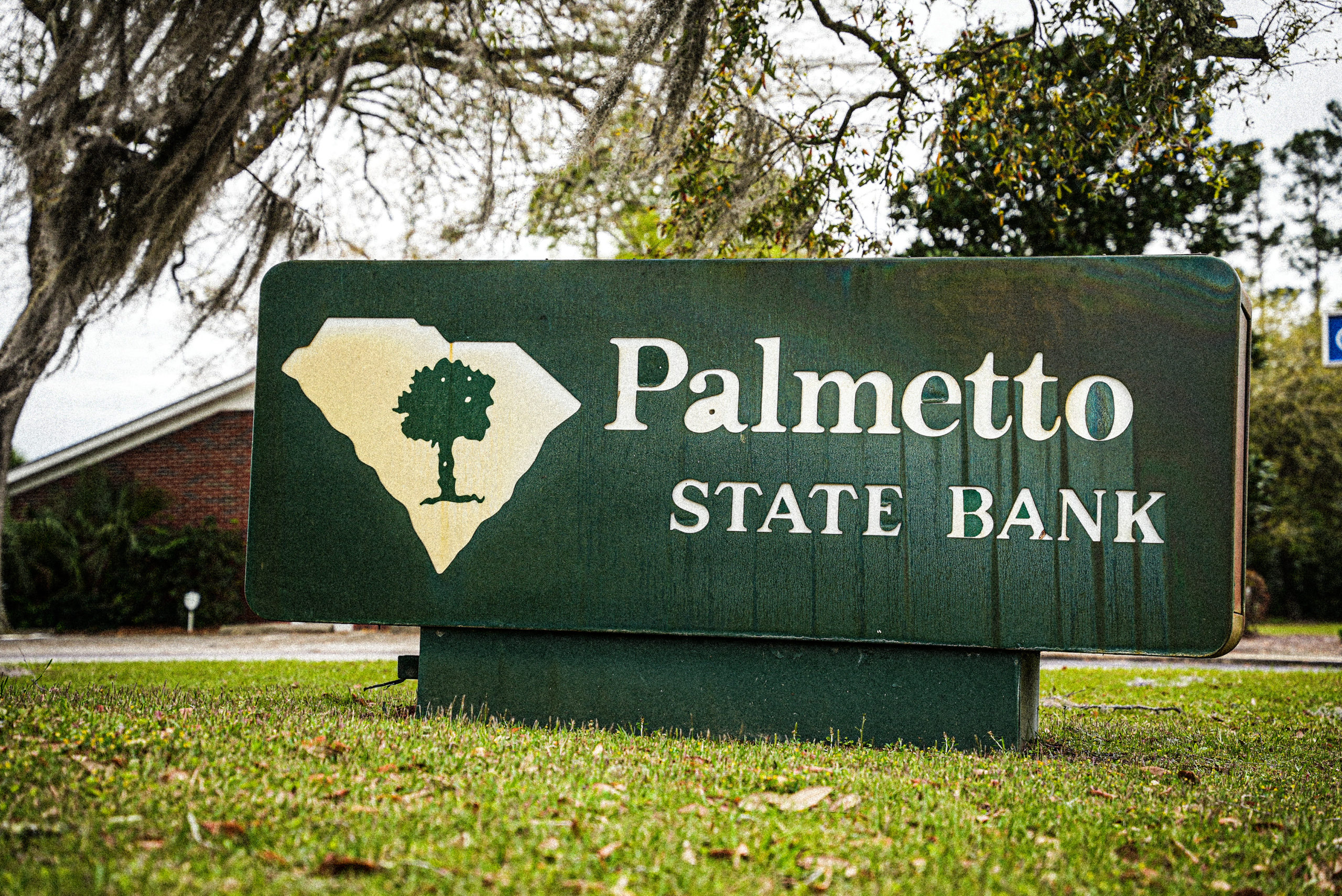A motion filed in Hampton County Court on Thursday reveals even more peculiar banking practices on the part of Alex Murdaugh, who was either Palmetto State Bank‘s best customer or its absolute worst.
According to the court filings, the bank allowed Murdaugh to carry unseemly negative balances on his accounts for years — sometimes in the six-figure range — yet continued to give him large loans, which he, in turn, did not pay back on time.
Additionally, the filing points out that Murdaugh’s banking behavior was unusual enough that it would have shown up regularly in anti-fraud reports.
“Given the significant and ongoing negative checking account balances in Murdaugh’s PSB accounts, Murdaugh’s name should have regularly appeared on such a report.”
Murdaugh faces 79 charges related to theft of nearly $9 million from clients.
In many ways, his alleged financial schemes could not have happened without his apparently cozy and forgiving relationship with the bank — specifically, his relationship with Russell Laffitte, who was fired as CEO this past January and now faces 21 charges for allegedly conspiring with Murdaugh to steal nearly $2 million.
Laffitte denies that he knowingly helped Murdaugh steal the money and maintains that he was duped.
“Inexplicably, in July 2021, the bank provided Murdaugh with a $750,000 line of credit at a time when Murdaugh had a checking account balance of negative $162,014.03,” the motion reads.
In a deposition in February, Laffitte testified that he didn’t have the authority to grant loans of such amounts.
Whether Laffitte was aware of Murdaugh’s alleged schemes or not, Thursday’s filings seem to show Murdaugh gave him plenty of opportunity to see that something was up.
The filings also show that Palmetto State Bank isn’t cooperating with their investigation.
The Overdrawn Accounts
On March 2, John T. Lay and Peter M. McCoy Jr. — the two attorneys who were appointed as co-receivers in November 2021 to tally Murdaugh’s assets — filed a subpoena seeking:
— Any and all documents related to accounts opened for Hannah Plyler, to include but not limited to all statements, loan documents, loan summaries, copies of checks, deposit slips and withdrawals.
— Any and all documents related to all accounts opened for Alaina Plyler, to include but not limited to all statements, loan documents, loan summaries, copies of checks, deposit slips and withdrawals.
Who are Hannah and Alaina Plyler? We’ll explain in a minute.
The subpoena also asked the bank to:
— Produce any and all documents related to all accounts opened for Arthur Badger, to include but not limited to all statement, loan documents, loan summaries, copies of checks, deposit slips and withdrawals.
— Produce any and all documents related to any account where Russell Laffitte served as the Conservator and/or Power of Attorney, to include but not limited to all statements, loan documents, loan summaries, copies of checks, deposit slips and withdrawal.
— Produce all Meeting Minutes from Board Meetings held from 2005 to the present.
As of Thursday, Palmetto State Bank had not complied, according to Lay and McCoy’s motion.
“Given the significant outstanding loans by Murdaugh, it could only be assumed that the Bank Board would have been interested in Murdaugh’s regularly negative checking account as well as the significant amount of money that flowed in and out of his accounts.”
The motion included the following jaw-dropping information:
— In February 2015, Murdaugh sought a line of credit for $500,000 secured by real estate. By May 2015, that line of credit was completely withdrawn and Murdaugh had a negative balance of $51,937. At the time, the bank approved raising Murdaugh’s line of credit to $1,000,000.
— In November 2017, just before receiving a line of credit in December 2017 with his father as co-borrower, “Murdaugh had a negative checking account balance every day for the entire month, except for seven days.” During that month, his account plummeted to negative $34,060.30. “In fact, Murdaugh’s balance was only made positive after receiving approximately $60,000 each from two separate family members and later advances from the line of credit the bank provided to Murdaugh in December 2017.”
— In February and March 2018, Murdaugh carried a negative balance for weeks at a time, hitting a low of negative $33,841.17.
— During the summer of 2020, Murdaugh wrote $152,155.87 in checks to Curtis “Eddie” Smith — the man whom Murdaugh’s attorneys called Murdaugh’s “drug dealer” — who allegedly conspired with Murdaugh in the bizarre roadside shooting over Labor Day weekend last year. Murdaugh’s account routinely held a negative balance, dipping to negative $53,302.22, “despite depositing significant draws from the $1,000,000 line of credit.”
“As could be imagined, Murdaugh’s loans routinely were past due with late charges assessed.”
Did the Bank Follow Protocol?
The Laffitte family has owned Palmetto State Bank for generations, and several family members — including Russell Laffitte — serve on the bank’s board of directors, which meets monthly in Hampton.
According to the filing Thursday, Laffitte also served on all of the board’s committees and was a loan officer from start to end. The bank approved around 50 loans a month, he said.
Right before becoming CEO in July 2020, Laffitte’s loan authority was only $250,000.
His loan authority is important because it speaks to who at the bank was involved in loaning Murdaugh money and what protocols were in place at the time.
According to Laffitte’s deposition, all executive officers at the bank were able to approve loans for more than $250,000. His father, Charlie Laffitte, had a million-dollar approval authority.
“I can’t think of the guy’s name in Bluffton,” Laffitte said. “John Sulka has a half a million in Bluffton. There may be some others.”
Sulka is the husband of Bluffton Mayor Lisa Sulka.
News began to emerge in September 2021 of a bank employee’s alleged role in the theft of $4.3 million from the family of Murdaugh’s housekeeper who died in 2018.
At the request of Alex Murdaugh, bank Vice President Chad Westendorf served as personal representative for the Satterfield estate and received a $30,000 for signing a few documents — a figure that far exceeded the statutory limits of what he could be paid from her estate.
***
***
His role as PR effectively removed the Satterfield family from the case and prevented them from even knowing a settlement had been reached in their case until this past year.
Soon after Westendorf’s role was revealed, word began to circulate that Russell Laffitte had helped Murdaugh in similar arrangements for years, serving as conservator or personal representative for families he didn’t know and, as in Westendorf’s case, never even met.
This arrangement appears to have often subverted the probate process and seems to have granted Murdaugh direct access to cash he otherwise would be prevented from acquiring.
Thursday’s filings give more insight into what information Laffitte had at his disposal when agreeing to help Murdaugh with his clients. It also raises questions about how any other customer would be treated in similar circumstances — however unlikely it is that anyone else would be granted such latitude at the bank.
During Laffitte’s February deposition with the co-receivers, he was asked about how the bank’s management and board of directors oversaw and reported Murdaugh’s unusual banking activity.
Laffitte told them that the officers of the bank have a “past due report” that they review every week.
“We would go through, discuss them, and what you need to do about them and what’s going on with them, talk to them about trying to get them renewed, get them paying, foreclosed, whatever,” Laffitte said.
The board of directors reviewed a monthly list of all new loans for more than $25,000.
“We’re asked — they’re asked if they want to ask any questions about any of the loans. They’re welcome to look at any of them.”
The bank received a monthly Banking Secrecy Act report and a Currency Transaction Report.
Those reports “typically show transactions by customers or others involving $10,000 in a daily aggregate amount or in currency pursuant to federal banking regulations. Presumably, Murdaugh’s name would have appeared on these reports.”
Indictments for Murdaugh have revealed that he was allowed to cash six-figure money orders at Palmetto State Bank, which seems to have been one of his alleged methods of converting funds in the firm’s client-trust account to cash that he could use himself.
The bank also had a Five Serve fraud-alert report that came out each morning.
Laffitte said during his deposition that a bank employee named John Peters received the report and that he was “sure some others did” as well.
Peters’ father was a partner at the former Peters Murdaugh Parker Eltzroth and Detrick.
“We discussed Alex’s accounts periodically if he was overdrawn, which was not uncommon, and what was going on with him, is he going to make a deposit. So we would discuss it.”
Who Are The Plylers?
For the first time since indictments began rolling out for Murdaugh and his alleged co-conspirators, Thursday’s filings put the names Hannah and Alaina Plyler, two former clients of his, on the public record.
On July 16, 2005, the Plylers — who were 8 and 12 at the time — were injured in a car wreck that killed their mother, Angela Plyler, and their 14-year-old brother Justin.
Angela Plyler was driving a 1999 Ford Explorer on Interstate 95 when the tire tread of her left rear tire separated and the SUV veered off the road and struck several trees.
The crash occurred in Hampton County, but the Plylers were residents of Lexington County.
On Nov. 16, 2006, Laffitte was enlisted to serve as a conservator to the two girls and oversee the millions they received in their case.
Neither Murdaugh nor Laffitte have been accused of stealing from the Plylers, but Laffitte appears to have used the girls’ accounts as a personal reserve from which he and Murdaugh gave themselves generous loans, according to sources with knowledge of their case.
Though Laffitte was careful to charge himself and Murdaugh interest, the rates were around 2.5 percent and 3.25 percent respectively, far lower than the bank was charging clients of Peters, Murdaugh, Parker, Eltroth and Detrick for “lawyer loans,” according to a previous report by FITSNews.
Laffitte and Murdaugh are accused of working together to steal money from another of Murdaugh’s clients and using it to pay back the secret loans taken from the Plylers’ money. It is not known whether the loans were fully satisfied.
*****
ABOUT THE AUTHOR …
(Via: Provided)
Liz Farrell is the new executive editor at FITSNews. She was named 2018’s top columnist in the state by South Carolina Press Association and is back after taking a nearly two-year break from corporate journalism to reclaim her soul. Email her at liz@fitsnews.com or tweet her @ElizFarrell.
***
WANNA SOUND OFF?
Got something you’d like to say in response to one of our articles? Or an issue you’d like to address proactively? We have an open microphone policy! Submit your letter to the editor (or guest column) via email HERE. Got a tip for a story? CLICK HERE. Got a technical question or a glitch to report? CLICK HERE.


